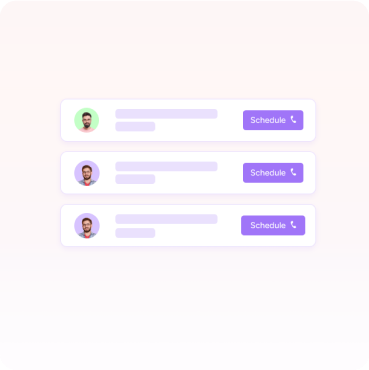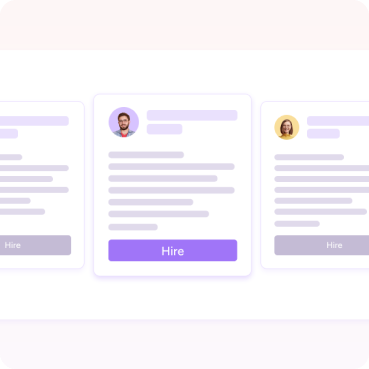Regular hiring
High RiskHire Angular developers of Silicon Valley caliber
Hire pre-vetted full time remote Angular developers from India. Hire now and build your dream engineering team with Hyno
Join 4,000+ companies already growing








Our Top Remote Developers
Hyno conducts rigorous testing and carefully vets the developers who are fueled by passion and skill sets. Hence, our developer community is the foundation for innovation and collaboration, bringing ideas and projects to fruition.
OUR STANDARDS
Hyno vs. Your regular recruitment process.
Find a risk-free, pre-interviewed, high-quality developer who is remote-ready in less than 2 weeks at 40% less cost.
Parameters
Choose the right for your firm.Time
Fees
Quality
Pre Screening
Remote readiness check
Termination
Failure rate
1 - 4 Months
> $1000
High
Low
Freelancing
High Risk1 - 2 Months
No fee
No
Very high
 Low Risk
Low Risk
0 - 15 Days
No fee
No
Very low
Pricing Starts from $35/hr
Accomplishing everything in just 3 steps
Our technical manager aligns the required skillset and tech stack with our talent pool to help you find the best fit.

Shortlisting candidates
Precise Hiring: Understanding, Gathering, and Shortlisting nittygritty.
-
 We start by thoroughly understanding your unique needs and specifications.
We start by thoroughly understanding your unique needs and specifications.
-
 check markWe
align the developer details with company goals. This way, we tailor the candidate
selection to seamlessly integrate with the organization’s vision and goals.
check markWe
align the developer details with company goals. This way, we tailor the candidate
selection to seamlessly integrate with the organization’s vision and goals.


Scheduling an Interview
Effortless talent selection: Finding your perfect match
-
 We connect you with the chosen candidates to ensure a personalized experience.
We connect you with the chosen candidates to ensure a personalized experience.
-
 Our rigorous
selection process guarantees that you find candidates who align seamlessly with your
requirements.
Our rigorous
selection process guarantees that you find candidates who align seamlessly with your
requirements.


Onboarding the talent
Streamlined onboarding for peak performance.
-
 The selected/qualified talent integrates smoothly through structured onboarding to
quickly adapt to projects, processes, and team dynamics.
The selected/qualified talent integrates smoothly through structured onboarding to
quickly adapt to projects, processes, and team dynamics.
-
 We go beyond
integration to offer ongoing support for a seamless transition to ensure that the
new talent exceeds your expectations.
We go beyond
integration to offer ongoing support for a seamless transition to ensure that the
new talent exceeds your expectations.


Read hiring guide
A one-stop shop to hiring the right Angular Developer.
How to hire a Angular developer? Skills to look for, interview questions, and more
Hiring a dedicated developer for your business can
be a cumbersome task. As many companies are competing to hire top Angular developer,
so finding a good developer is not as easy as it may seem.
We're here to assist all employers who choose to hire Android developers on their
own. Recruiting a developer on your own requires a fair amount of software
development experience in general. However, if you're a non-technical manager
interested in learning more about how to hire a Angular developer, we've put up an
excellent resource for you.
Things to check Key Skills Required for a Angular developer?
The following are the key skills that a developer should possess to become proficient in Angular:
1. Angular Framework: The developer should have a strong understanding of Angular and its concepts such as components, services, directives, templates, pipes, and modules.
2. TypeScript: Angular is built on TypeScript, so the developer should be proficient in TypeScript and its features such as interfaces, classes, and generics.
3. JavaScript: Angular developers should also be proficient in JavaScript as it forms the foundation of Angular.
4.HTML/CSS: Angular developers should have a good understanding of HTML/CSS and how they are used in conjunction with Angular components.
5. RESTful APIs: Most Angular applications communicate with a backend using RESTful APIs, so the developer should have a good understanding of how to consume and interact with APIs.
6. RxJS: RxJS is a reactive programming library used extensively in Angular, so the developer should have a good understanding of its concepts such as observables, subscriptions, operators, and subjects.
7. Testing: Angular developers should be proficient in writing unit tests, integration tests, and end-to-end tests for Angular applications using tools like Jasmine and Karma.
8. Debugging: The developer should have a good understanding of debugging Angular applications using tools like Chrome DevTools.
9. Git: The developer should have experience working with Git and understanding concepts such as branches, merging, and resolving conflicts.
10. Agile methodology: Angular developers should be familiar with Agile methodology and have experience working in an Agile development environment.
Ideal Hiring Process for Angular Developer
1. Define the job requirements: Clearly define the job requirements, including the experience level, technical skills, and soft skills required for the position.
2. Write a compelling job description: Create a detailed job description that includes the job responsibilities, required skills and experience, and any other relevant details.
3. Post the job opening: Post the job opening on relevant job boards, professional networks, and your company website. Be sure to mention that the position is remote.
4. Screen resumes: Review resumes and cover letters to determine if the candidate meets the job requirements.
5. Conduct phone/video interviews: Conduct a preliminary phone or video interview to assess the candidate's experience and skills.
6. Technical skills assessment: Depending on the level of experience required, conduct a technical skills assessment such as a coding challenge or project.
7. Cultural fit assessment: Assess the candidate's cultural fit by conducting a behavioral or personality assessment.
8. Reference check: Check the candidate's references to ensure their experience and skills match their resume.
9. Offer the job: Once you have identified the best candidate, make a job offer that includes the job responsibilities, compensation package, and start date.
10. Onboarding and training: Once the new hire has accepted the job, provide them with onboarding and training materials to ensure a smooth transition into the role.
Important Interview questions to ask to Hire a Angular Developer
What is your experience with Angular, and how have you used it in your previous projects?
This question is designed to gauge the candidate's level of experience with Angular and their ability to apply it to real-world projects. Candidates should be able to provide examples of how they have used Angular to build web applications and discuss any challenges they encountered during the process.
Can you explain the difference between ngOnChanges and ngOnInit in Angular?
ngOnChanges and ngOnInit are lifecycle hooks in Angular that are used to perform initialization and respond to changes in component input. ngOnInit is called once when the component is initialized, while ngOnChanges is called whenever the input properties of the component change.
What is the difference between a component and a directive in Angular?
A component is a type of directive in Angular that has a template and a view, while a directive can be used to modify the behavior or appearance of an existing element. Components are typically used to create reusable UI elements, while directives are used to add behavior or styling to existing elements.
How do you optimize the performance of an Angular application?
Candidates should be able to discuss techniques for improving the performance of an Angular application, such as lazy loading, AOT compilation, tree shaking, and caching. They should also be familiar with tools like the Angular CLI and Webpack that can be used to optimize the size and loading time of an application.
How do you handle errors in an Angular application?
Candidates should be familiar with error handling techniques in Angular, such as using try-catch blocks, handling HTTP errors, and using error interceptors. They should also be able to discuss best practices for logging and debugging errors in an Angular application.
How do you communicate between components in Angular?
Candidates should be familiar with techniques for component communication in Angular, such as using input and output properties, using services to share data, and using the @ViewChild and @ContentChild decorators to access child components.
What is the purpose of the async pipe in Angular, and how is it used?
The candidate should discuss their experience with React Native, how they have used it, and how it differs from Angular.The async pipe in Angular is used to handle asynchronous data streams and render them in the template. Candidates should be able to explain how the async pipe works, how to use it to handle HTTP requests and observables, and how to use it with the ngFor directive to iterate over asynchronous data.
How do you test an Angular application, and what testing tools do you use?
Candidates should be familiar with testing techniques in Angular, such as using Jasmine and Karma to write unit tests and Protractor to write end-to-end tests. They should also be able to discuss best practices for writing testable code and using mocking and stubbing to isolate dependencies.
How do you integrate third-party libraries or APIs into an Angular application?
Candidates should be familiar with techniques for integrating third-party libraries or APIs into an Angular application, such as using npm packages, creating custom services, and using Angular's HttpClient to make HTTP requests. They should also be able to discuss best practices for managing dependencies and versioning.
What is your approach to debugging and troubleshooting issues in an Angular application?
Candidates should be able to discuss their approach to debugging and troubleshooting issues in an Angular application, such as using browser developer tools, console logging, and debugging techniques like breakpoint debugging. They should also be familiar with techniques for identifying and resolving common Angular issues, such as circular dependencies and performance bottlenecks.
Job Description Template for Angular Developer
Location: [Insert Location]
Job Title: Angular Developer
Position Type: Full-Time
Salary: [Insert Salary Range]
We are seeking a skilled Angular Developer to join our team and help us build dynamic and responsive web applications. The ideal candidate will have experience with Angular 2+ and be familiar with modern web development technologies and best practices.
Key Responsibilities:
- Develop high-quality, scalable, and maintainable web applications using Angular.
- Collaborate with designers, product managers, and other developers to define requirements and implement new features.
- Write clean, modular, and well-documented code that follows best practices and industry standards.
- Implement responsive design and ensure cross-browser compatibility and accessibility.
- Work with RESTful APIs to fetch and manipulate data, and integrate third-party libraries and tools as needed.
- Write unit tests and end-to-end tests to ensure the quality and reliability of the application.
- Debug and troubleshoot issues in the application, and provide timely resolutions to ensure a smooth user experience.
- Continuously improve the application by gathering feedback from users and stakeholders, and implementing new features and enhancements.
Requirements:
- Bachelor's degree in Computer Science or related field, or equivalent experience.
- At least 3 years of experience in Angular development, with a strong understanding of Angular 2+.
- Proficient in HTML5, CSS3, and JavaScript, with experience using modern web development frameworks and libraries.
- Familiarity with web development tools such as Git, Webpack, and npm.
- Experience with RESTful APIs, and integrating third-party libraries and tools.
- Experience with testing frameworks such as Jasmine and Protractor.
- Strong analytical and problem-solving skills, with a keen eye for detail.
- Excellent written and verbal communication skills, with the ability to collaborate effectively with cross-functional teams
- Passion for staying up-to-date with the latest web development technologies and best practices.
If you are an experienced Angular Developer who enjoys working in a fast-paced, challenging environment, we would love to hear from you. Please submit your resume and cover letter for consideration.